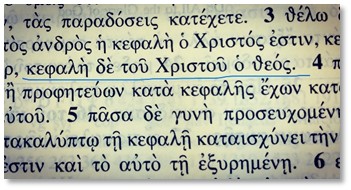 Bruce Ware and Kevin Giles have been sparring over gender roles and the nature of the Trinity. The controversy came to a head in a paper that Dr. Ware read at the most recent meeting of the ETS. You can read about the encounter here, and you can download and read Dr. Ware’s paper here.
Bruce Ware and Kevin Giles have been sparring over gender roles and the nature of the Trinity. The controversy came to a head in a paper that Dr. Ware read at the most recent meeting of the ETS. You can read about the encounter here, and you can download and read Dr. Ware’s paper here.
Dr. Ware was recently elected to serve as president of the ETS.




14 Comments
Pingback:
Scot McKnight
Denny,
I’ve read the summary kernel linked from your site. Here’s the quotation from Augustine at Gender-News:
“In the light of this we can now perceive that the Son is not just said to have been sent because the Word became flesh, but that he was sent in order for the Word to become flesh, and by his bodily presence to do all that was written. That is, we should understand that it was not just the man who the Word became that was sent, but that the Word was sent to become man. For he was not sent in virtue of some disparity of power or substance or anything in him that was not equal to the Father, but in virtue of the Son being from the Father, not the Father being from the Son.”
Here’s Ware:
“I cannot say why Professor Giles omitted the very portion of the quotation that supported my claim that Augustine affirms the pre-incarnate authority of the Father over the Son,” Ware said in his paper.
“But whatever the reason, the fact remains that Augustine affirms both the essential equality of the Father and the Son along with the pre-incarnate functional submission of the Son to the Father. Giles’ own discussion, by its attenuated quotation of Augustine, turns out to be the treatment of Augustine which in fact denies what Augustine affirms.”
Now can you tell me how Ware gets the words “pre-incarnate functional submission of the Son to the Father” from that paragraph above? It seems to me it is saying nothing more than what was said in the previous paragraph (I don’t quote that), namely, that the Son is eternally generated and that the Father is begetter and the Son begotten. We speak of the Father’s primacy in being the one who begets. I fail to see beget-begotten as “submission.”
In fact, that citation says that the Son was sent not because of disparity in power or substance (“power” is an authority word) but because the Father is eternal begetter and Son eternal begotten.
Enlighten me brother.
dennyrburk
Dear Scot,
I think Ware’s remarks are best understood within the context of his whole paper. That being said, here’s where Ware is getting “pre-incarnate functional submission of the Son to the Father”:
Pre-incarnate = Augustine’s “Word”
Functional = Augustine’s denial of “disparity of power or substance”
Submission = Augustine’s insistence that the “word” was “sent.”
of Son to the Father = Augustine’s “the Son being from the Father, not the Father being from the Son”
Like I said, you have to weigh Ware’s remarks within the context of his larger argument that sending language in the Bible and in church history implies a relationship of authority-submission.
I think one thing is for certain. In John’s Gospel, “sending” language does imply such a relationship between Jesus and His Father. I think most would agree with me. The question is whether Jesus’ submission was a peculiar facet of His incarnation, and not a part of His Trinitarian attributes.
Ware argues that the submission of the Son in the incarnation is but a reflection of what always has been (eternity past) and always will be (eternity future). This is why Ware sees such significance in Augustine’s point that “the Word” was sent in eternity past.
Thanks,
Denny
Scot McKnight
OK, I thought that might be the case. If that is Ware’s argument, and I do want to read his paper, he’s not said anything that Giles can’t respond to. “Send” is not the same as “submission.” It is pushing categories already set up to see submission in send.
Not unlike what I suspected, brother: either I’m blind or you (and Ware) are seeing things. Which is another way of saying our theology might be running the show.
Here’s Augustine: “disparity of power or substance or anything in him that was not equal to the Father”. Now, what this says is not what I would think would be “functional.” If it were only “substance” (esse), then I could see “functional.” But, since “power” or “anything … not equal” are used, I suspect “functional” is not quite the best term. It is saying the sending is an equal-maintaining act.
dennyrburk
I haven’t read enough of Augustine to have an opinion worth listening to. I suppose it would be a helpful study to follow up. What does Augustine mean by his “sending” terminology?
But I have read John’s Gospel, and I do think the subordination of the “Word” to the “Father” who sends Him is clear. So what’s your verdict on John’s Gospel. Don’t you think the Son submits to the Father in John’s Gospel?
Thanks,
Denny
Scot McKnight
Does the word “submit” occur in John’s Gospel for sending? Or does that have to be imported as an “explanatory” device? (You know where I’m going here: if we import it, are we importing our theology or describing what is really there?)
dennyrburk
In John’s Gospel, the idea of hierarchy is not conveyed through the use of the word “submit.” What you see is the collocation of the themes concerning the Father who “sends” the Son and the Son who only does His Father’s will.
For example, John 5:30: “I can do nothing on my own. As I hear, I judge, and my judgment is just, because I seek not my own will but the will of him who sent me.”
Or John 4:30: “My food is to do the will of Him who sent Me, and to accomplish His work.”
Or John 6:38: “For I have come down from heaven, not to do My own will, but the will of Him who sent Me.”
The Son can only do what His Father wills (e.g., 4:34; 5:30; 6:38; 8:29; 12:49), and the Father is consistently portrayed as the One who “sends” the Son (e.g., 5:23, 24, 30, 37; 6:34; 7:16, 18, 28, 33; 8:16, 18, 26, 29; 9:4; 12:44-45; 14:24; 15:21; 16:5; 20:21).
I don’t think that there is much controversy in the literature over the fact that the Son submits to the Father in John’s Gospel. This point is pretty well established. The controversy is about whether this submission is a temporary feature of the Incarnation or an eternal feature of intra-Trinitarian relationships.
Thanks,
Denny
Scot McKnight
Denny, no question that one can call Johannine “submit,” thought John doesn’t. This same John says “I and the Father are One.” But I wouldn’t do two things:
1. Make that eternal; orthodoxy teaches eternal generation not eternal subordination.
2. Call it subordination; that is being done (in my estimation) for little more reason than arguing for female submission/subordination.
dennyrburk
I think the biblical text motivates us to embrace the functional subordination of the Son to the Father. Paul says as much in 1 Corinthians 15:28 where the Son’s “subjection” to the Father is a feature of the New Creation.
In 2004, I wrote an article on Philippians 2:6 for Tyndale Bulletin in which I argued that Christ’s “being in the form of God” is a different reality than being “equal with God.” In His pre-incarnate state, Christ was in the “form of God” (=essential deity), but He did not grasp after being “equal with God” (=functional/economic equality).
All I’m trying to say is that there are plenty of scriptural motivations for seeing Christ’s functional subordination to the Father.
Thanks,
Denny
Scot McKnight
But Denny it is a [can’t find the right word: one word with two meanings of significantly different order] to use “subordination” of Son in order to use “subordination” of women in marriage and Church.
The entire thrust of the eternal subord of the Son came about because of a conviction (already held) that women should be subordinate to husbands/at Church.
I don’t question 1 Cor 15 or Phil 2; I just don’t think it is fair to logic to use “subord” for 1 Cor 15 and Phil 2 and then use the same term in the debate about women.
Scot McKnight
Hope this goes through: the orthodox have not spoke of eternal subordination (it sounds Arian) but of eternal primacy of Father (and then we are led into the filioque clause debate). That’s the context.
Brian W
I hope its not inappropriate for me to jump in, but I’ve been thoroughly encouraged by the evidence of the mutual “submission” (of course, that word isn’t used, but I’m using it in the same way it seems Denny is using it) betweeen the Father and Son (and Holy Spirit also, but I won’t get into that).
We constantly see the Father glorifying the Son, constantly exalting him above all, constantly entrusting to him all things, constantly giving him the name above all names. I call this submission, in that the Father doesn’t seek his own, but lowers himself and grants the glory, honor, power and work to the Son. And the whole time this is happening, the Son is saying, “Look at my Father,” “I can’t do anything apart from my Father.” He lays it down for the sake of his Father, too. It’s almost as if you don’t see one without the other.
Submission is so often viewed in a narrow sense. I submit to my wife when I give up what I could call mine for her good. I submit to my kids when I give up what I want to do for their good. When submission is relegated to this very narrow category of “yielding to authority”, we speak of it (dare I say) in an unbiblical way since we are to “submit to one another out of reverence for Christ.” While “authority” could be included in some aspects of submission, it seems that it actually isn’t very integral to the way the scriptures use this term.
Scot McKnight
Denny,
I’ve spoken with two theologians, systematicians and acknowledged as experts in the academy and both thoroughly orthodox — both agree that using the word “subordination” for the Son’s relationship to the Father dangerously close to Arianism and not part of the orthodox vocabulary.
dennyrburk
Scot,
That’s why Ware is so careful to distinguish his view from the classic Arian heresy. Ware and every other Complementarian I know renounce the Arian heresy with all their might. If they use the word “subordination,” they are giving it a different meaning than the Arian heresy.
Thanks,
Denny